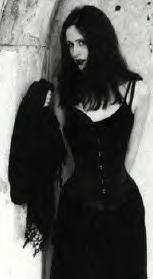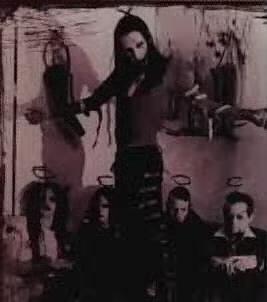
Goth as a counter-culture
1969: The hippie counter-culture saw that the world sucked and promised to change it with love.
1979: Punk culture saw that the world still sucked and raised a middle finger in defiance.
1981: Goths understood all along the importance of a good smoke.

Age: 12-50
Behavior: Broody, dramatic, sensual, given to excessive romanticism
Climate: Cool, damp, and dark
Diet: Hors d'oeuvres and cigarettes
Intelligence: Above average
Favorite Color: Black
Major: Art, literature, languages, psycholgy
Music: Gothic and Rock & Roll
Natural Habitat: Cemetaries, cafes, bookstores, libraries, laboratories, the internet, and sometimes goth clubs
Natural Range: Northern Europe and english-speaking countries, England and Germany are the two culture focci.
Occupation: Artist, computer-related, literature-related, student, clerk
Race: Any (but being pale is a plus)
Religion: None, any
Sexual Orientation: None, any, all
There is a huge amount of diversity in the goth scene: very few people conform to the stereotype. Below is an attempt to show some of that diversity.
Moral: Don't believe in generalizations about goths, not even the ones you read here.
attitude: None. They like goths, also known as "week-enders".
clothes:Modern clothes found in mainstream stores, except black.
Romanitc Goth
attitude: My capacity for love is certainly greater than this mortal coil can bear.
clothes: Anything with lace and frills: Edwardian, Victorian, Renaissance.
Mopey Goth
attitude: Gentle people always perish in an unkind world.
clothes: Romantic, mod
Fetish Goth
attitude: Gentle people are excellent for spanking.
clothes: Leather, PVC, fishnet, chains.
Goth Geek
attitude: It's better than being a plain geek.
clothes: Mod
Perky Goth
attitude: Woohoo!
clothes: Mod, fetish
Vampire Goth
attitude: Vampires are cool.
clothes: Formal evening wear, Romantic.
Pagan Goth
attitude: The occult and/or celtic religions are cool.
clothes: Romantic, gypsie.
Ren Fair Goth
attitude: The Renaissance Fair and role-playing games are cool.
clothes: Medieval, renaissance, Scottish.

No. Some goths are fed up with the media's having seized on Marilyn Manson as the definitive gothic icon, and with it's contast characterization of them as Manson worshipping Spooky Kids.
Gothdom didn't grow out of punk. Some were a bit confused by the label and started to think that the label Goth was in some way connected with the Victorian Gothic revival and Gothic horror and because enough of them thought that enventually it became true.
The first generation Goths complain that second and third generation Goths often seem to think that Gothdom is about wearing the blackest black, with a lot of silver jewelry and looking as thin and pale as possible.
Currently Germany is the bastion of Goth, where they are called Grufties. Today Goth is about music, literature, art and clothes.
Gothdom embraces all religions, all denominations and all races. Many Goths are atheists and a sizable minority are new age spiritualists, Wiccans and members of other alternative religions groups. There are Christian Goths. Basically Goth is not about religion, but with the imagery of religion. Many goths wear crosses or ankhs, and there are many religious references in goth songs, but it is not a religious movement.
Religious jewelry is often worn, particularly crucifixes and ankhs. These are strong symbols with subconscious effects. Sometimes they are worn as an satirical statement, soemtimes not. For some it is just fashion.
Gothic music is very difficult to classify or categorize. Most people agree though that there are three general 'waves' of gothic music.
Middle Thingy - early 1980's to somewhere in the latish 1980's
Modern - end of Middle Thingy to now
From then until the early 1990's the scene went a bit queit, with the only bands making an impression being Fields of the Nephilim, The Mission (a slinter group of the Sisters of Mercy), and All About Eve. The early 1990's saw a revival, lead by Rosetta Stone, whose music at the time was similar in nature to that of the Sisters of Mercy in 1985. The 1990's has seen a wealth of new bands spring up, ranging in sound from old school to styles previously unheard.
The 1990's have also moved the geographic base of gothic music. The late 70's and 80's bands were pretty much Uk based, but with notable input from Australia (Nick Cave, Birthday Party), the USA (Christian Death), and Germany (Xmal Deutschland). It is true that the largest proportion of gothic bands are still UK based, but the scene as a whole has a much more international flavor.
There are key elements of style, substance, presentation, and past association. It's generally dark, often so are the band - but it is definitely more than singing about vampires, Satan, blood, death, doom, love, sex, drugs, and whipping; although that's enough for some people. Most importantly the music must speak to you, the little bit which seems to enjoy the night, and the dark.
The Oxford Dictionary gives the definition as "goth n. 1) A style of rock music with an intense or droning blend of guitars, bass, and drums, often with apocalyptic or mystical lyrics. 2) a performer or devotee of this music, often dressing in blackclothing and wearing black make-up."
Ask any goth though and you'll get a different definition. In fact you'll get just about as many definitions as goths that you ask.
The term 'Goth' was used by Ian Astbury who described Andi Sex Gang as a 'gothic pixie'.
Siouxsie Sioux (of the Banshees) used 'Gothic' to describe the new direction for her band.
Probably the earliest usage, as applied to music though was by Anthony H. Wilson (Joy Division manager) who was overcome by a rare moment of lucidity on a 1978 BBC TV program when he described Joy Division as Gothic compared with the pop mainstream.
The word 'Goth' does indeed refer to a tribe of the Indo-European kind. The Goths slowly integrated into the melting pot of Europe and basically disappeared.
The word 'gothic' is first found in common usage in 1611, refering mainly to an 'uncivilized lack of taste or education'. It was also refered to as Ogive - or the characteristic arch of this style - this word is usually used by most politically correct historians.
The fact is: Ogive architecture today is extremely inspiring and beautiful. The nameless men who designed and built these works of grandeur were very talented and inspired. One merely has to look at the Cathedral of Chartres, Paris, Amiens, Canterbury, or any of the other edifices of this age to realize the irony of using 'gothic'. In fact, to augment the irony, the popular opinion today is that much of the baroque architecture of the 17th and 18th centuries is gaudy and flamboyant.